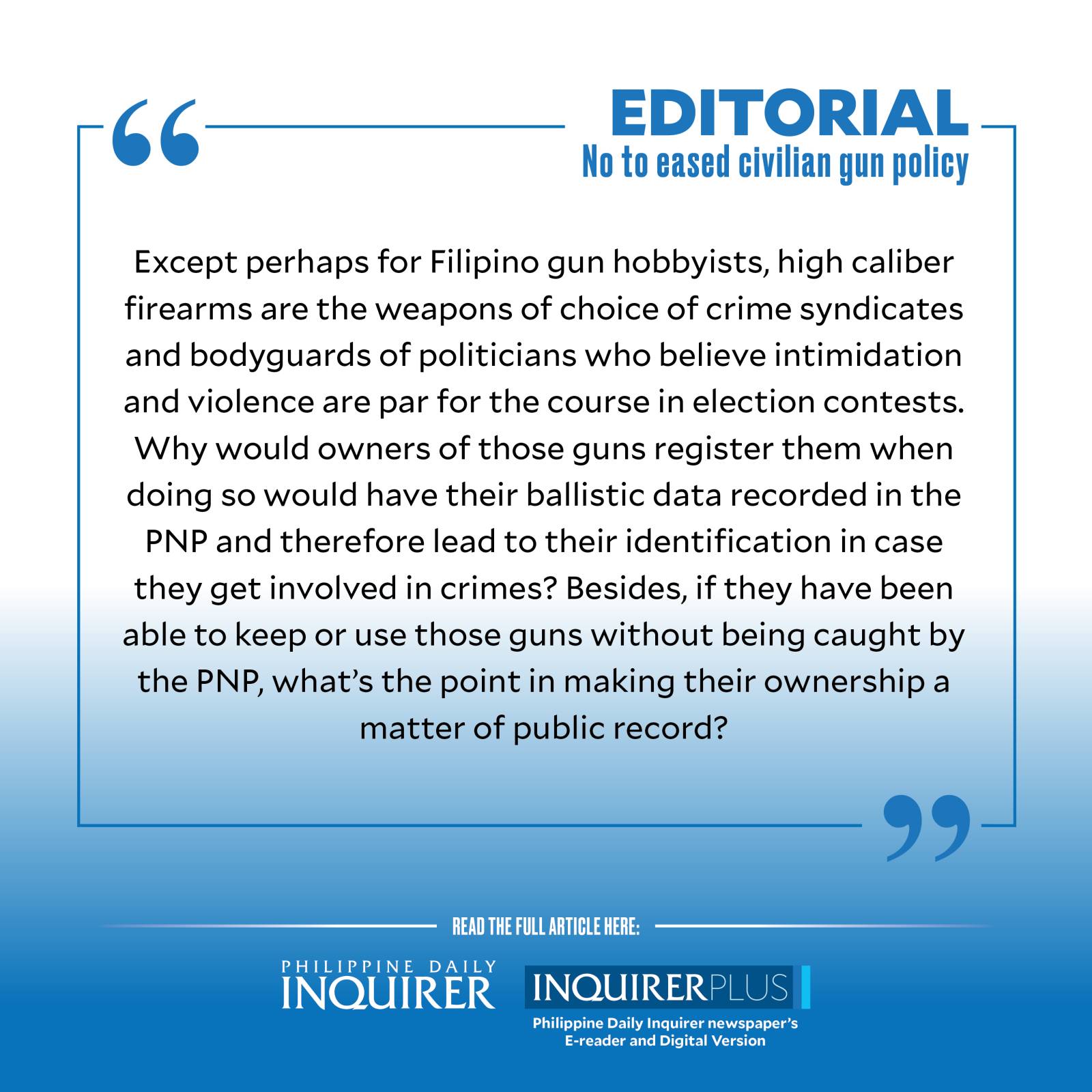
As if the hands of the Philippine National Police were not already full attending to the proliferation of loose firearms in the country, it wants to put more lethal guns at the hands of civilians.
A recent amendment by the PNP of the implementing rules and regulations of Republic Act No. 10591 (or the Comprehensive Firearms and Ammunition Regulation Act) now allows civilians to own 7.62 mm semi-automatic rifles and guns with lower calibers.
Since semi-automatic guns can, depending on their make, discharge bullets in rapid succession, they are classified as assault weapons that military and police personnel use in critical operations or when confronting criminal elements who are armed with high-powered guns.
According to the PNP, allowing civilians to own those guns would promote responsible gun ownership because it would encourage those who already own them to have them registered.
Neuro-psychiatric tests
To allay fears that its move may result in a spike in criminal incidents, the PNP said the process for securing a license to own and possess those firearms, which includes drug and neuro-psychiatric tests, would ensure that they would not fall into the wrong hands.
That assurance was cold comfort to Gunless Society of the Philippines president Norman Cabrera who said: “Majority of heinous crimes are committed with the use of firearms, which gun advocates argue do not often involve theirs that are licensed. While they point their fingers to illegal firearms, these are the natural offshoot of the State’s policy where arms end up among criminal syndicates [big and small] …”
The PNP’s action had been criticized by some senators, including Sen. Risa Hontiveros who said “Our society, families, and schools will be safer if we reduce the guns that may be used to kill and commit other crimes.”
Mass shootings in the United States
There is historical basis for the apprehension that the availability of semi-automatic guns to civilians after years of their prohibition may give rise to a spike in gun-related crimes.
Apparently, the PNP had ignored or overlooked the fact that the firearms of the calibers it now wants to make available to civilians had been involved in mass shootings in the United States.
Those rapid firing guns inflicted the most lethal results in those shooting sprees.
According to Gun Violence Archive (a nonprofit organization that provides online date about gun violence in the US), in 2023, there were at least 627 mass shootings in the US. In 2022 and 2021, the mass shootings were 645 and 690, respectively.
It defined mass shootings as incidents where four or more victims are shot or killed.
Many of the fatalities of those mass shootings were of school age and those who survived suffered from serious injuries and psychological trauma that needed counseling.
Notably, the mass shootings happened in spite of strict security measures in the crime scenes.
Weapons of choice
If the PNP thinks giving civilians more access to semi-automatics guns would encourage those who already own them to have them registered, it must be dreaming.
Except perhaps for Filipino gun hobbyists, high caliber firearms are the weapons of choice of crime syndicates and bodyguards of politicians who believe intimidation and violence are par for the course in election contests.
Why would owners of those guns register them when doing so would have their ballistic data recorded in the PNP and therefore lead to their identification in case they get involved in crimes?
Besides, if they have been able to keep or use those guns without being caught by the PNP, what’s the point in making their ownership a matter of public record?
For some politicians, that disclosure may result in a contest of “one-upmanship” or making sure their firepower is equal to or better than those of their opponents.
Subliminal message
In civilized societies, the responsibility of maintaining peace and order is vested on the police and other law enforcement agencies of the government. For that reason, they are authorized to carry firearms and use them when the need arises.
If that task is being ably performed, there would be need for civilians to arm themselves unless the threat to their safety is clear or imminent. Presumably, the police can be relied upon to protect them or prevent untoward events from happening to them.
The PNP’s decision to liberalize the ownership of high-powered guns is, in effect, sending the subliminal message to the public that the crime situation in the country has deteriorated so much that civilians must arm themselves for their own protection.
If the PNP gets its way on the availability of semi-automatic guns to civilians, we may soon have to brace ourselves for incidents similar to mass shootings in the US.
And gun stores and funeral houses would be very happy!

